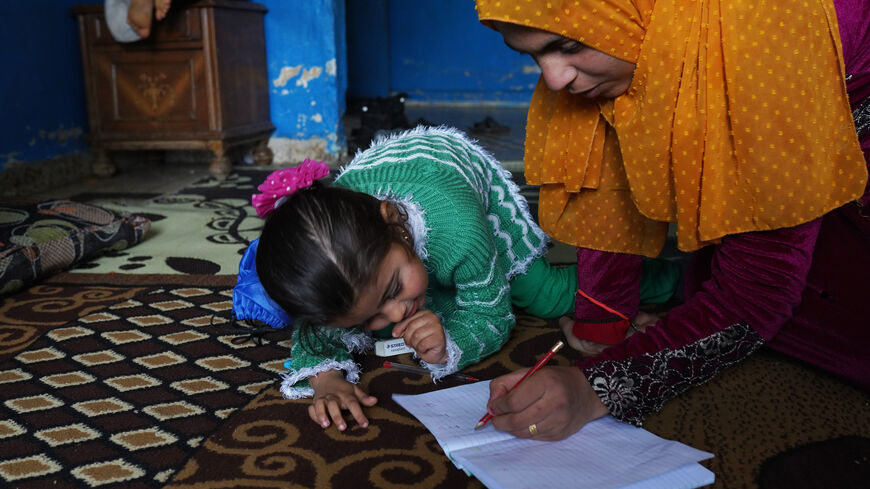Soliciting money through TikTok livestreams has become a popular but controversial trend in Syrian refugee camps in Lebanon, where individuals are using the platform to earn an income that is paid in fresh dollars, amid the local currency deprecation.
The method has allowed thousands to beg for money from donors online by exposing their children and poor conditions to the outside world. Human rights activists told Al-Monitor that the trend heightens the risk of exploitation and trafficking of children.
For users to go live on TikTok, they must have at least 1,000 followers, who in turn can donate digital gifts. A wide range of gifts can be purchased with real money, from roses and hearts for less than a dollar to larger gifts for hundreds of dollars.
Begging through 'wishful blessings'
They ask viewers for money by repeating phrases of supplication, but the process of obtaining the funds they receive from viewers is subjecting the platform to controversy. A report published by the BBC revealed the “exploitation” by TikTok of such content, where in some cases the company take 70% of the proceeds.
Some of the livestreams have generated up to $1,000 an hour, but users in refugee camps received only a tiny fraction of that, the BBC said.
Cash withdrawals can only be requested if the user has a withdrawal method supported by TikTok in their region or country. PayPal is the most frequently used payment method, but it is not available in Lebanon.
Users in Lebanon are instead turning to private cash withdrawal agencies, or by transferring the money through PayPal to someone they trust overseas, who then sends it back to the user through Western Union or other agencies accessible in Lebanon.
In hopes that viewers around the world will sympathize with their plight and provide them with gifts, users share their stories about their hardships. They also pray and send wishful blessings to the donors as a way of thanking them. The livestreams expose their vulnerability and state of living, and some show the kind of items they've brought with the money after receiving the gifts, such as food, blankets, and clothing through posting videos on their page.
Thousands of refugee families live under the poverty line in the camps of Lebanon, and humanitarian conditions where affording basic necessities has become a daily challenge. Thus, many have recently turned to look for ways to secure income.
'Life changing' or tool for trafficking?
Al-Monitor interviewed Hamada Mamesh, a Syrian refugee and a viral TikTok user with more than 60,000 followers. He is living in Akkar in north Lebanon, and relies on TikTok livestreams to make a living.
Working as a factory worker and multiple other labor jobs since he arrived in Lebanon in 2014, Mamesh said he was struggling to provide for his family, which consists of two wives and eight children.
“TikTok was a life changer — for me and my family — especially in the current economic crisis in Lebanon where salaries are worthless,” Mamesh told Al-monitor.
Mamesh and his family have gained unexpected popularity on TikTok, with fan pages under his name that repost his videos and convince people to watch his livestreams.
He said that his main goal is not to become famous, but rather he uses the platform for financial gain. “I just want to be able to provide for my family and overcome the poor living conditions,” he added.
Creating a live broadcast on TikTok is not an easy process for many refugees. First it requires creating an account, obtaining equipment and locating an internet connection, then the account needs 1,000 followers to unlock the capability to go live.
Razan Najem, human rights activist and expert in digital media rights and protection, told Al-Monitor about the lack of censorship on TikTok and the violation of terms and services.
“The purpose of these livestreams and accounts is to receive virtual gifts and to build a rapport with donors whom they can later have a direct connection with in order to receive money from them directly, rather than through TikTok. These families have become aware of the large cut that the platform takes,” said Najem.
He noted that the scenes that children are appearing in, are humiliating for minors, don't come with consent, and carry long-term consequences. “The first of these risks is the exploitation of a child to earn money, and the biggest of them is child trafficking,” he warned.
Child traffickers can easily find out the location and identity of the children in the videos and reach out to them and potentially harm them, according to Najem.
“There is a social stigma that children [who appear on TikTok videos] will suffer later when they grow up, which will expose them to various psychological problems. So TikTok needs to up its game to ensure the safety of these children by imposing stricter censorship and restrictions,” Najem added.
According to a November report by the UN Office for the Coordination of Humanitarian Affairs, 14.6 million Syrians are in need of humanitarian assistance, almost 7 million people have been internally displaced and 5.5 million people have sought refuge in neighboring countries.
Some donors from the Gulf region have become aware of these livestreams and want to help families in need by sending virtual gifts that are equivalent to hundreds of dollars.
Anadel al-Enezi, a Kuwaiti donor who has helped several families through TikTok livestreams, told Al-Monitor that the dire situation they are in prompted him to help.
“The videos of families and children begging started to appear on my feed page and I felt the urge to help because of the situation they are in, especially since I am aware of the economic situation in Lebanon and the hardship they face after having fled the war,” he said.
TikTok could not be reached for comment, and the company has previously denied that such content is allowed on its platform.








